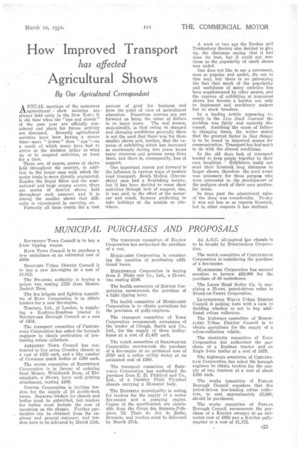How Improved Transport
Page 47

If you've noticed an error in this article please click here to report it so we can fix it.
has affected
Agricultural Shows
By Our Agricultural Correspondent
ANNUAL meetings of the numerous agricultural show societies are always held early in the New Year ; it is the time when the "ups and downs" of the past year are officially considered and plans for future activity
are discussed. Recently agricultural societies have been having a severe timeniore " downs " than "ups "—as a result of which many have had to arrive at the decision either to wind up or to suspend activities, at least for a time.
There are, of course, scores of shows held throughout the country, in addition to the larger ones with which the motor trade is more directly acquainted. Besides the Royal Shim and the seminational and large county events, there are scores of district shows held throughout each summer, and it is among the smaller shows that difficulty is experienced in carrying on.
Formerly all these events did a vast amount of good for business and from the point of view of agricultural education. Numerous reasons are put forward as being the cause of failure
in so many cases. The real reason, undoubtedly, is that owing to changed and changing conditions generally there is not the need that there was for these smaller shows and, further, that the expense of exhibiting which has increased so enormously during late years keeps many concerns and persons away from them, and there is, consequently, loss of support.
One important reason put forward is the influence in various ways of modern road transport South Molton (Devonshire) once had a flourishing society, but it has been decided to cease show activities through lack of support, due, it was said, to the effect of the motorcar and coach, farmers preferring to take holidays at the seaside or elsewhere. A week or two ago the Bretlon and Tewkesbury Society also decided to give up, the chairman saying that it had done its best, but it could not continue as the popularity of small shows was ended.
One does not like to see a movement, once so popular and useful, die out in this way, but there is no gainsaying the fact that much of the popularity and usefulness of many societies has been supplemented by other means, and the expense of exhibiting at numerous shows has become a burden not only to implement and machinery makers but to stock breeders.
In a leading article appearing recently in the hive Sleek 'Journal the
problem was fairly and squarely discussed. Ascribing the cause of failure to changing times, the writer stated that the greatest factor in that change is to be found in improved means for communication. Transport has had much to do with the altered conditions.
In the old days lack of transport tended to keep people together in their
own localities. Exhibitors -ootild not send their livestock long distances to larger shows, therefore the locel event was necessary for those persona who were interested in the developmen+ of the pedigree stock of their own particular areas.
In days past the educational value of the show was considerable. To-day it was not less so as regards livestock, but in other respects it has declined.












































































































